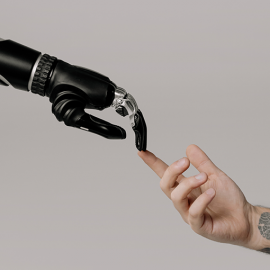Connecting with Culture
Our blog reflecting on weekly news, trends, innovation, and the arts...
Read
‘The metaverse may be virtual, but the impact will be real.’
Chances are you’ve seen these words before. They’re the tagline to Facebook owner Meta’s latest advert, giving people a utopian ‘glimpse of what the benefits [of the metaverse] could be.’
As Professor John Wyatt explained in this blog, the metaverse is ‘a 3D virtual reality (VR) world in which it is claimed we will soon be able to live our lives.’ It’s attracting billions in investment. Major brands and artists like Nike and Snoop Dogg have launched VR-only products. And popular games like Roblox and Minecraft are evolving into massive, self-contained worlds, exactly as Wyatt describes.
Like it or not, the metaverse is coming for us. And, according to Meta, that means we’ll soon be learning in virtual classrooms, practicing surgery on virtual bodies, and visiting our forebears in virtual history. In another of their campaigns, we see a father and daughter on opposite sides of the USA, fishing together in VR.
The message is clear: far from driving us deeper into digital isolation, the metaverse will expand our world. Somehow, while removing the need for physical buildings, teachers, and family visits, it will enrich our work, education, and relationships.
Spot the inconsistency. As Kingdom Code’s James Docherty noted at the Work & Go conference, the remote working boom has underlined our desperate need for time together. In the end, our bodies aren’t just annoying meat bags we have to cart about. They’re essential to the way God made us.
It’s no accident that Jesus’ embodiment is central to our faith – we don’t just receive God’s word at a distance, but his Word made flesh. Likewise, if we want to minister grace, love, and truth, most times we need to be there.
Which brings us to the question of what a Christian response to the metaverse looks like. Kneejerk rejection is rarely the best option. But there’s wisdom in remembering this technology is shaped by a culture fascinated with self-gratification: ‘If VR is the quickest way to success, then into the headset we go.’
We, by contrast, are called to a life of Christlike service (Philippians 2:5–11). Often, that means remembering what’s fastest or easiest isn’t necessarily what’s best. So when the metaverse opens its doors to you, perhaps the most helpful first question to ask is simply: ‘Who will I help here?’ And tied to that: ‘When might that help be more Christlike with the headset off?’
—
Josh Hinton
Head of Communications
LICC
